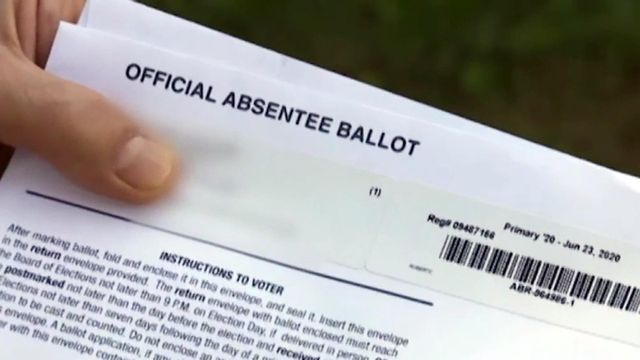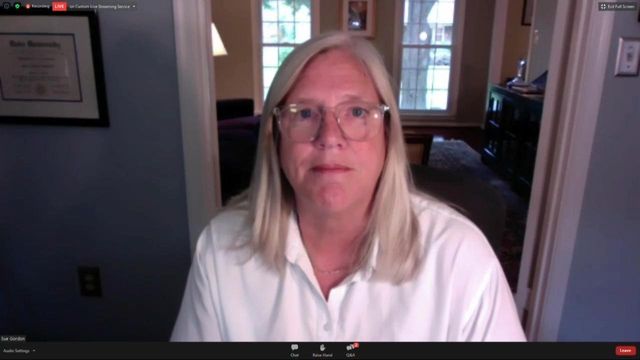Trump campaign tells elections boards across NC to ignore state guidance on absentee ballots
County boards of elections across North Carolina on Tuesday started the process of determining which absentee ballots could be accepted and which needed further work by voters.
Posted — UpdatedWith record numbers of voters casting ballots by mail this election because of the pandemic – more than 278,000 ballots have already been mailed in, compared with fewer than 200,000 total in the 2016 election – the task is an arduous one that will last past Election Day. A battle between President Donald Trump's campaign and state elections officials isn't making it any easier, either.
The Trump campaign sent a letter to all Republicans on county election boards, urging them to disregard new state guidelines for absentee-by-mail ballots.
- A voter could "cure" a ballot found to be faulty for lack of a required witness signature with an affidavit rather than casting another ballot with a signature.
- Voters could hand-deliver their ballots to county elections offices by putting them into a dropbox without having to sign a logbook. The box would have to be staffed, but if a ballot is dropped off when no one is there, the ballot couldn't be discarded solely for that reason.
- Absentee ballots could be accepted if they are postmarked by Election Day and received by officials by Nov. 12. The current deadline to receive such ballots is Nov. 6.
Judith Kelley, dean of the Sanford School of Public Policy at Duke University and an international expert on election security, said it's "absolutely not common" for a political campaign to instruct local election officials on which state rules to follow or not follow.
"I don’t recall a similar situation," Kelley said, adding that the letter is the latest aspect of a national push by the Trump campaign to cast doubt on the outcome of the upcoming elections.
"It’s an effort to sow confusion and to undermine the confidence in the process," she said. "We should all be able to unite around the process, and this is not – this is not helpful."
Sue Gordon, a former deputy director of national intelligence who now teaches political science at Duke, said foreign adversaries have been trying to do that for years.
"This national conversation that is centered around lack of trustworthiness or you can’t believe it or there’s massive cheating – that in itself is an undermining act," Gordon said.
The State Board of Elections sent out a response to county elections officials, reminding them they’re required to follow state directives and aren't allowed to take advice from political parties.
"Guidance sent to you or your board members by a political party or other source should not be considered or followed," the state board wrote in its letter.
Gordon said the U.S. election system is secure, and there is no evidence of large-scale fraud or outside interference.
"I believe the election results will be believable. I do. I think our system is sound," she said. "The question is whether the parties will allow them to be believed."
Kelley said she is concerned about the weeks following Election Day on Nov. 3, when many absentee ballots will still need to be counted.
"I think we have to be careful not to use fear in this election," she said. "The state of our democracy itself is what is most concerning. This is a highly volatile situation, and I am very concerned about how the American people and politicians will conduct themselves in the weeks after the election."
Trump and other leaders are setting voters up to believe that that delay will mean those ballots are problematic or fraudulent, she said. Although there's no evidence to support the president's repeated allegations of massive mail-in election fraud, she said, the effort to create uncertainty could lead to civil unrest.
"The greatest threat to America is that we don't believe in ourselves," Gordon said.
"I think it comes down to the fact that this president is not actually trying to win this election – this president is trying to not have to concede this election. That’s what going on," Kelley said.
To minimize the disruption, she advised voters planning to cast ballots by mail to get them in early and trust the process.
"This election is not going to be won by massive mail-in ballot fraud," Kelley said, adding that, although absentee ballots are rejected at a much higher rate than in-person ballots, the rate of rejection is only 1%.
Most absentee ballots are "not rejected because of fraud, but because voters make mistakes with pen and paper," she said, encouraging voters to fill out their ballots carefully and send them in early so they can be tracked like any other piece of mail.
"U.S. citizens should feel comfortable that we have done a lot of things to protect the voting system," Gordon said.
Related Topics
• Credits
Copyright 2024 by Capitol Broadcasting Company. All rights reserved. This material may not be published, broadcast, rewritten or redistributed.






